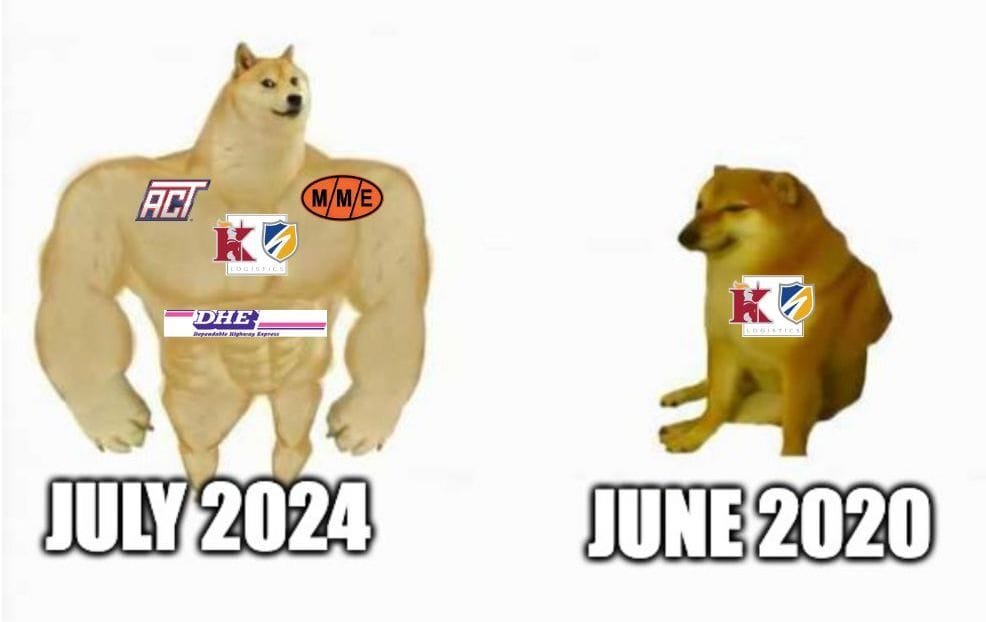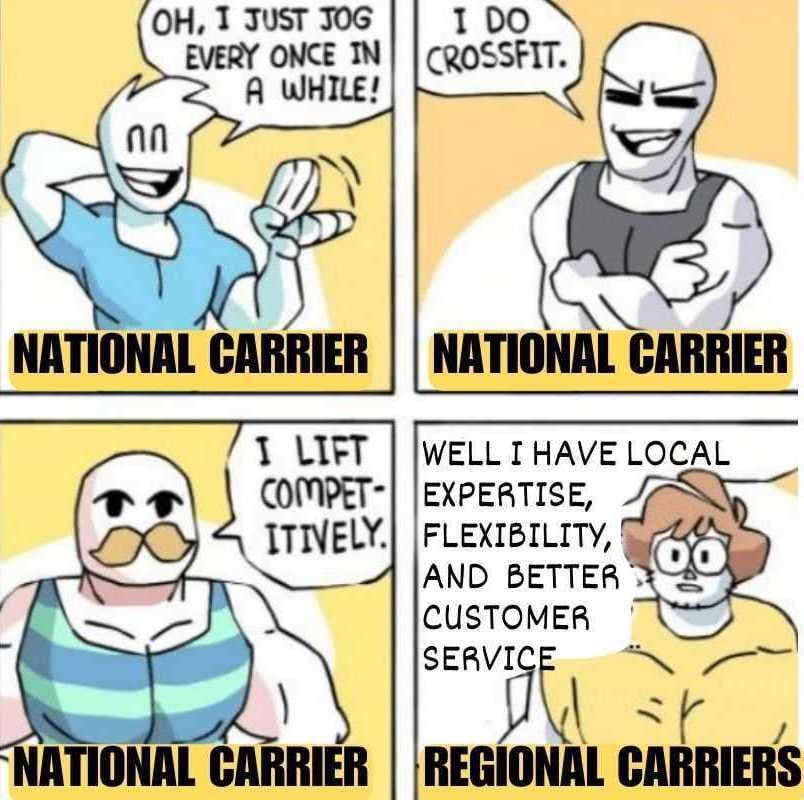- Let's Talk Logistics
- Posts
- Knight-Swift’s Strategic Entry into the LTL Industry
Knight-Swift’s Strategic Entry into the LTL Industry
Knight-Swift's regional puzzle pieces are positioned to form a national freight powerhouse....anyone seeing this??
Welcome back, #LetsTalkLogistics crew! Update: the freight world is shifting beneath our very feet.
Knight-Swift Transportation is on an ambitious quest that's got the entire LTL sector buzzing. Their master plan? Forge a nationwide LTL powerhouse by strategically acquiring regional champions.
Today in #LetsTalkLogistics we examine Knight-Swift's bold entry into the LTL market -their three strategic acquisitions from 2021 to 2024, their unique approach of building a national network through regional players, and the potential impacts they have on the LTL industry.
Give it a read, pass it along, and don't hesitate to share your thoughts - especially if you think I've missed the mark. (Or simply react with a rocket emoji if you believe I've hit the nail on the head 🚀)
The Evolution of Knight-Swift LTL: Timeline
July 2021: Acquisition of AAA Cooper
Knight-Swift Transportation made a significant leap into the less-than-truckload (LTL) sector by acquiring AAA Cooper Transportation for $1.35 billion.
This strategic move marked Knight-Swift's first major investment in the LTL market. AAA Cooper, based in Dothan, Alabama, brought with it a robust regional network comprising 70 facilities, 3,400 doors, and a fleet of 3,000 tractors and 7,000 trailers.
This acquisition provided Knight-Swift with an immediate foothold in the Southeastern and Midwestern United States, significantly enhancing its service capabilities and market presence.
December 2021: Acquisition of Midwest Motor Express
Continuing its expansion, Knight-Swift acquired Midwest Motor Express (MME) for $150 million.
MME, based in Bismarck, North Dakota, operates 33 terminals and offers comprehensive services across the Upper Midwest and Northwest regions.
This acquisition further solidified Knight-Swift's LTL network, extending its reach and enabling it to offer next-day and second-day services through strategic partnerships.
March 2024: Acquisition of Dependable Highway Express (DHE)
Knight-Swift's latest acquisition of DHE for $150 million marks another critical step in its LTL expansion strategy.

DHE, headquartered in Los Angeles, operates 13 service centers and over 500 doors, enhancing Knight-Swift's presence in the Western U.S. This acquisition aligns with Knight-Swift's vision to create a comprehensive, nationwide LTL network by integrating strong regional players.
Building a National Carrier Network
Knight-Swift's approach of building a national LTL carrier network by patching together strong regional players is unprecedented. Historically, the LTL market has been dominated by national carriers like Estes, FedEx, SAIA, R&L, and XPO.

These carriers offer extensive networks and comprehensive services, but Knight-Swift's strategy aims to combine the strengths of regional players to provide a competitive alternative.
Advantages of This Strategy:
Local Expertise: Regional carriers like AAA Cooper, MME, and DHE have deep-rooted knowledge of their respective markets, leading to more efficient and reliable services.
Enhanced Flexibility: A network of strong regional players can offer greater flexibility and tailored services compared to a monolithic national carrier.
Competitive Edge: By integrating these regional networks, Knight-Swift can offer comprehensive LTL services that rival those of established national carriers.
Future Acquisitions
To complete its national LTL network, Knight-Swift is likely to target acquisitions in the Northeast.
Potential candidates include WARD or A Duie Pyle, both of which have strong regional presence and would fill the geographical gap in Knight-Swift's network...
This strategic move would position Knight-Swift as a formidable competitor to the likes of SAIA and XPO, offering an integrated and efficient alternative in the LTL market.
Comparison of National and Regional Carriers
National Carriers (e.g., SAIA, XPO):
Extensive Networks: National carriers have vast networks that cover the entire country, offering consistent and widespread services.
Standardized Operations: These carriers benefit from standardized operations and processes, ensuring uniform service quality.
Scale Advantages: National carriers can leverage economies of scale to reduce costs and offer competitive pricing.
Nationals (The Hulk) vs. Regionals (Bruce Banner)
Regional Carriers (e.g., AAA Cooper, MME, DHE):
Lower Damage Rates: Regional carriers tend to have lower damage rates due to their localized operations and shorter transit distances.
Faster Transits: Regional carriers can often provide faster transit times within their specific regions, improving delivery efficiency.
Responsive Customer Service: With a focus on specific regions, regional carriers can offer more responsive and personalized customer service, addressing issues and inquiries more quickly and effectively.
By combining the strengths of regional players, KNX aims to offer a unique and competitive LTL service that can rival national carriers, providing customers with the benefits from both:
extensive coverage mixed with specialized, flexible service.
What's your take on Knight-Swift's strategy? Are they building the future of LTL…or are they taking on more than they can handle?
This development demands the attention of every logistics professional – it could reshape the entire LTL landscape! Drop your thoughts on what’s happening and #letstalklogistics!